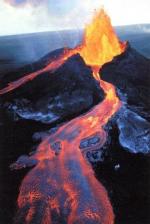|
This section contains 817 words (approx. 3 pages at 300 words per page) |

|
A volcanic eruption is the release of molten rock and volcanic gases through Earth's crust to the surface. Molten rock within the earth, or magma, is driven to erupt by buoyancy because it is lighter than the surrounding rock. Dissolved gases within the magma are under great pressure and force magma upwards. The upward migrating magma takes advantage of preexisting zones of weaknesses such as fractures or established volcanic necks until it eventually breaks through the surface.
An eruption may last for a few minutes or many hours and days. An eruption may be only a discharge of steam and gases through a small vent, a relatively mild oozing of lava from a fissure in a shield volcano, or a spectacular explosion that shoots huge columns of gases and debris into the sky. The explosiveness of an eruption depends to a great extent on the composition...
|
This section contains 817 words (approx. 3 pages at 300 words per page) |

|


